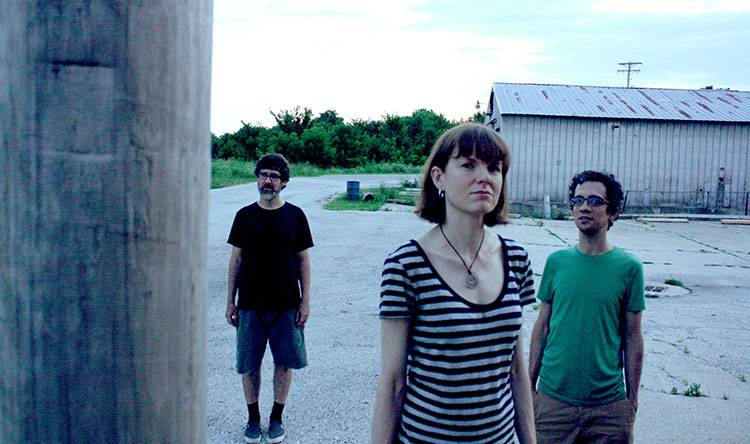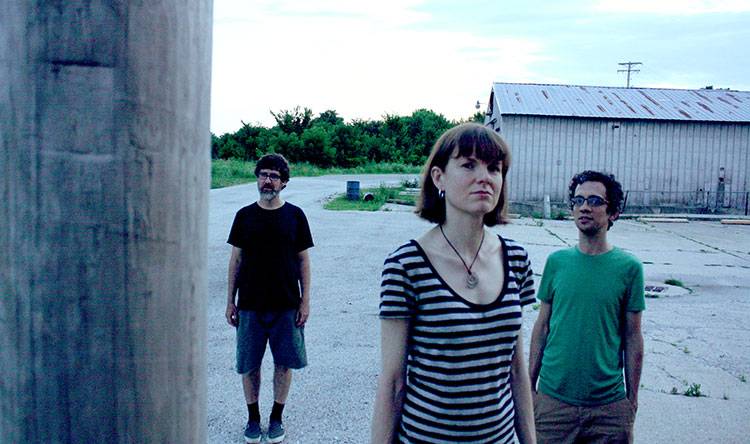Urbana’s Motes are a trio of musicians making fuzzy, flowing, indie pop with the ambience and cacophony of early 90s post-punk. They consist of Matt Mitchell and Elizabeth Majerus on songwriting, vocals and guitar, and Matt Cohn as the backbone on the drums. Matt and Elizabeth are husband and wife, and I had a chance to chat with the couple about their upcoming show at Urbanalove’s outdoor summer movie night this Saturday, featuring a screening of “The Goonies.”
Smile Politely: What do you consider some of your main influences, musical and otherwise?
Matt Mitchell: We’ve all been listening to music for so long, often together, it’s really hard to single out a handful of influences. Our writing process is pretty intuitive—we don’t consciously “intend” a particular sound or style—and it’s like all the stuff I’ve listened to throughout my life comes out in some way or another. And listeners will always hear what they hear, which won’t always align with what we think our influences are. I love being compared to a band I’ve never heard of. Matt (Cohn) has his own set of influences, specifically in terms of drumming, but for my guitar playing and songwriting, some of the most audible influences would probably include big names like Sonic Youth, Yo La Tengo, My Bloody Valentine, the National, maybe Modest Mouse, Helium, or Built to Spill—all the usual suspects for guitar-driven, sometimes discordant, sometimes melodic indie rock. But I’ll produce melodies and riffs that make me think of New Order or the The Cure or Love and Rockets, or Pavement or Polvo. It’s all in there somewhere.
Elizabeth Majerus: Matt (Mitchell) and I have been friends forever and married for much of that time, and we started out listening to a lot of the same bands, and then introduced each other to more bands we both ended up being passionate about. I would echo Mitchell in listing Sonic Youth, Yo La Tengo, My Bloody Valentine, Modest Mouse and Helium as influences. It feels like the National has almost become part of my DNA, I’ve listened to them so much in the past five years, and I think that’s become some sort of influence on my way of seeing the world if not on the music I make specifically. I’d add Wolf Parade, Sleater-Kinney, Cat Power and Regina Spektor to my influences. Even though Motes doesn’t sound like Joni Mitchell, I’ve been obsessed with a few mid-career albums of hers since I was a kid, so that’s in there. She was also a musician Mitchell and I bonded over very early on. When I learned that he was heavy into both Fugazi and Joni Mitchell, I knew I’d found a member of my tribe.
SP: As academics, how does your affinity for the written word impact your music?
Mitchell: We both tend to enjoy the richness and ambiguity of the English language, and our tastes in poetry and fiction as well as songwriting are pretty similar. We like wordplay, and lyrical lines that aren’t especially straightforward or literal. I might have a particular set of associations or even a kind of narrative in mind when I’m working on a song, but it’s always interesting to me when listeners hear something quite different in it. Like, for our soon-to-premiere video for “Freeway,” John Isberg came up with the whole narrative concept, based in part on the lyrics and general vibe of the song–and he’s produced this wonderful, light, nostalgic story of a teenage crush. I had something much different, a little darker and more unsettled, in mind when I was writing the song—a tone that might be at odds with the sound of the music, as it turned out. It’s not that John is wrong about the song, but the video reflects his vision, how he hears it.
Majerus: I love poetry, and the poetry I like tends to be ambiguous and often playful, tends to combine darkness and humor. I gravitate toward lyrics that have those qualities as well, and I’m always unsatisfied with my own lyrics if they don’t feel like good poetry to me, line by line. Writing poetry is harder than writing lyrics, in my view, because you can’t conduct the way your audience hears the words––the pace, the emphasis––and you can’t embellish particular words or phrases with shimmering or crashing or soothing sounds. But I want my lyrics to offer images rather than conclusions, and I want them to suggest possibilities to the listener, not nail things down.
SP: How do you guys feel about genres and being frequently labelled as shoegaze?
Mitchell: It’s not a label I ever gave much thought to, and it wouldn’t have occurred to me to describe our music in that way. “Dream pop” is another one I hear sometimes, and I’m not sure what exactly it signifies, but people seem to hear it in our music. I don’t mind labels—if it gives someone a context within which to understand and appreciate our stuff, that’s fine with me, and if we remind them of other stuff, that’s also fine with me. But it’s not a term I’d self-apply. I don’t think I listen to a lot of “shoegaze,” although I’d probably like some of it if I gave it a chance. I get why people describe MBV that way, but I always associated them more with noise rock and post-punk in the Sonic Youth vein. When I first heard Isn’t Anything back in the early 90s, I was struck most of all by how un-British it sounded, compared to all the Manchester stuff that was current at the time. I saw them open for Dinosaur on their last American tour before the hiatus, and they made sense to me as loud, experimental guitar music. I only learned the “shoegaze” label recently.
I do sometimes wonder how well the term applies to us, and I worry that someone who expects “real” shoegaze will be disappointed by us somehow. It’s like we fit into the genre by accident.

SP: Your music is often summery and shimmering, evoking a beachy feel. Being in a landlocked and frigid locale, how do you keep the warmth alive?
Mitchell: It’s really nice that you say so. I grew up on the Jersey Shore, about a mile from the beach, and as a kid I spent pretty much every day in the summer hanging around at or near the beach and boardwalk. Elizabeth grew up on Lake Michigan, in Chicago and Sheboygan, Wis., so we both have some deep-seated connections to vast bodies of water and the whole beach vibe. So it’s odd that we’re both living in Urbana, right? We spend about a month every summer in Jersey, which is pretty much a requirement for me to be able to live in landlocked Urbana the rest of the year. And in fact, I’ve not thought of this before—a bunch of our songs originated in things I would play on my guitar in our room at my folks’ place, so some of our music really does originate around that beach setting.
Majerus: Summer travel helps, especially making it to the water. The Atlantic Ocean, my favorite body of water Lake Michigan (both figure into our song “Great Lake”), and the Spokane River are all places we visit pretty much every summer with our kids. Reading a lot also helps to take me “elsewhere,” as does listening to music constantly and intently, old favorites and new music. I do like Urbana quite a bit, despite it being landlocked. This town has some lovely trees, and I’ve always appreciated the wild yards and gardens in the various near-downtown neighborhoods I’ve lived in. I try to stay attuned to the vibrant parts of life wherever I happen to be, the changing seasons, the beauty that exists in pain as well as happiness and pleasure. I try not to spend too much time checked out in front of a screen, which is hard—screens can be a lot of fun, but they also tend to dull perception if you get too sucked in for too long.
SP: What can listeners anticipate from this upcoming show? Are you excited about opening for “The Goonies”?
Majerus: We are excited about opening for “The Goonies,” yes! And just excited to be part of this cool outdoor community event. I brought our kids to see the Urbanalove showing of “The Royal Tennenbaums” and that was a pretty sublime experience. I am a fan of downtown Urbana and always happy to be outdoors when artsy stuff is going on in that neighborhood.
Motes are playing Saturday night around 7 p.m., and later debuting their new Swede Films-produced music video for the song “Freeway” at the lot at 129 N. Race Street in downtown Urbana. Their show, and the following screening of “The Goonies,” are free for all ages.








